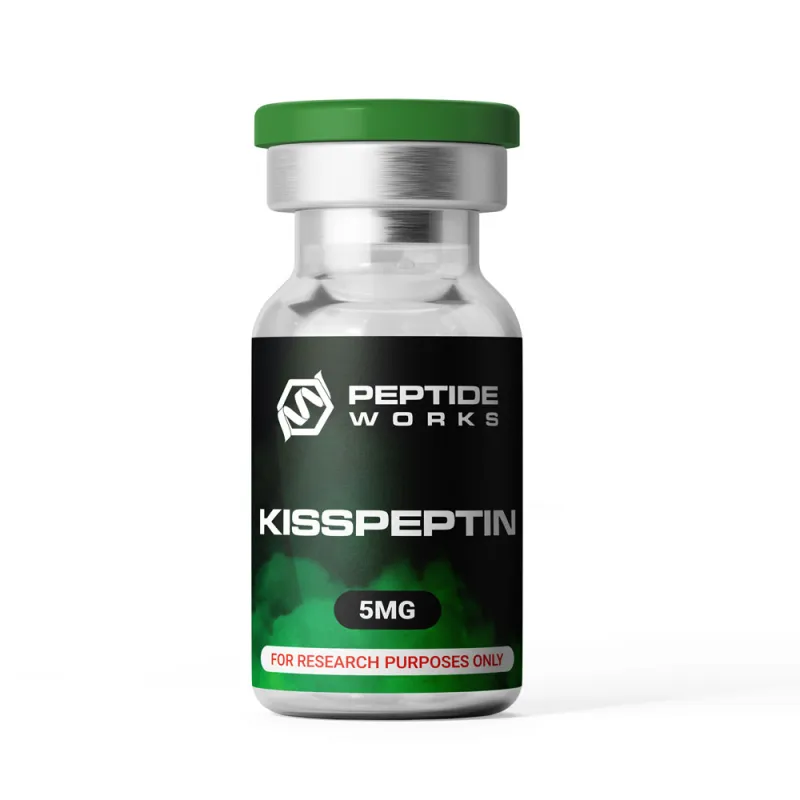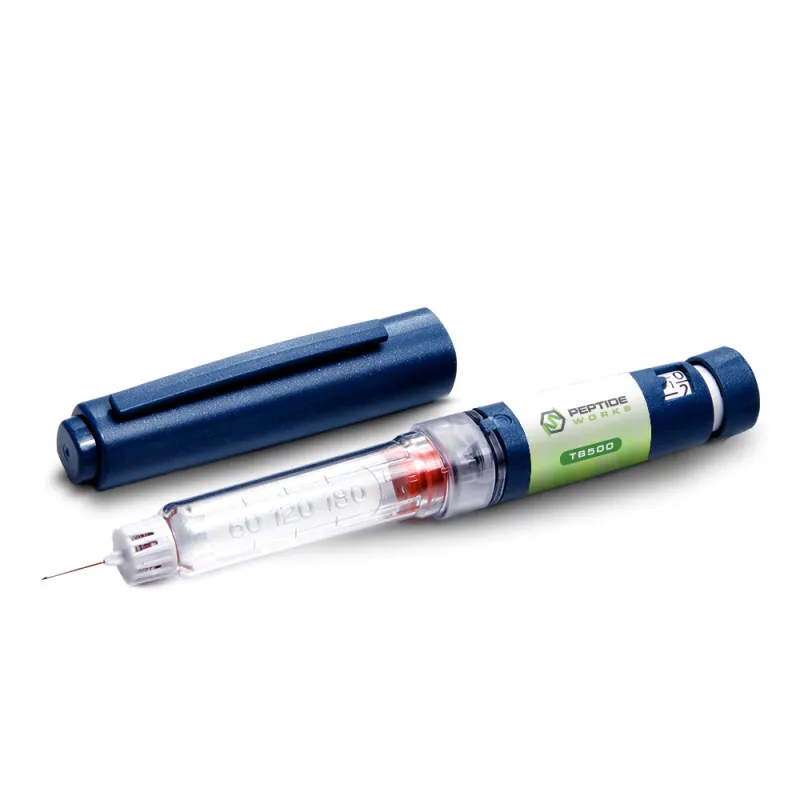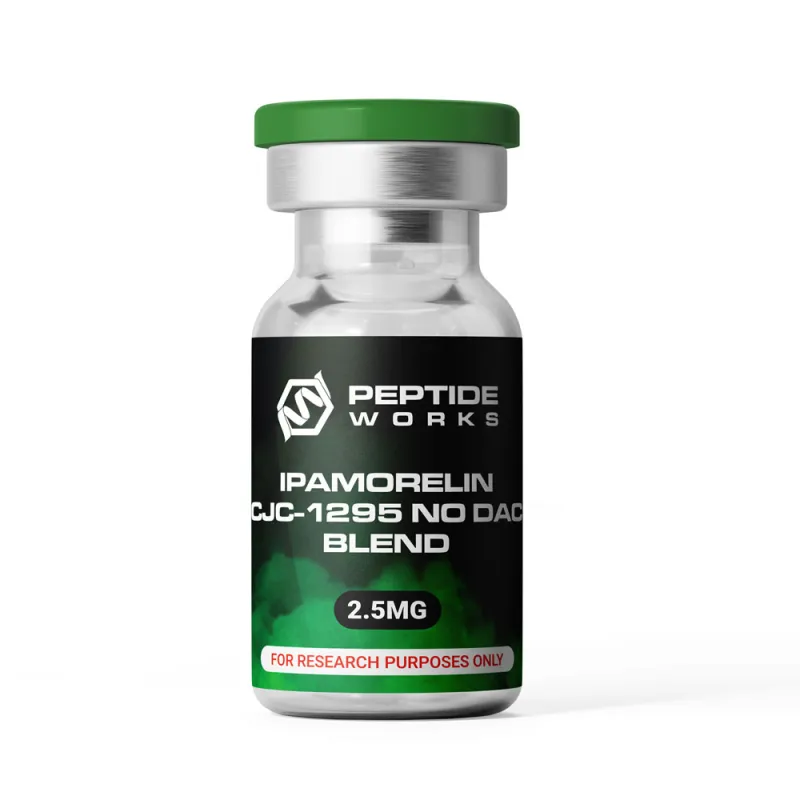
PROMO!
First order? Get 10% OFF with this code: 1storder
Written by

Do you feel drained, struggle with focus, or notice your drive slipping during perimenopause? These common symptoms can feel frustrating. Hormone fluctuations during the menopause transition disrupt energy, mood, sleep, and intimacy. This volatility drives many women to search for support beyond standard solutions.
Researchers are now exploring bioactive peptides and their influence during this stage of life. These short chains of amino acids act as cellular messengers. Early studies suggest they play roles in hormone signaling, energy support, recovery, and sexual vitality.
This guide explores the best peptides for women in perimenopause and connects them to real concerns like low libido, fatigue, and midlife vitality. Before exploring specific peptides, we must first understand why these symptoms occur.
Discover Kisspeptin from Peptide Works, a peptide linked to reproductive signaling and brain pathways that may influence attraction and desire.

Energy often dips in perimenopause because the body works harder to adjust to changing hormones. Many women notice increased fatigue during the day as sleep becomes lighter, hot flashes disrupt rest, and metabolism slows. Without steady, deep sleep, recharging proves difficult, making daily tasks feel more draining.
At the same time, changes in estrogen and other signaling chemicals affect sexual desire and mood. Vaginal dryness or discomfort reduces interest in intimacy, while stress and anxiety create barriers to connection. These concerns shape ongoing studies on the best peptides for women in perimenopause, as researchers explore how they relate to energy balance and sexual wellness.
With these challenges in mind, researchers investigate several peptides to understand how they may relate to perimenopausal health.
When looking at the best peptides for women in perimenopause, researchers are studying several compounds that connect to concerns like fatigue, libido, mood, and recovery. Each has unique functions in the body, and studies continue to explore how they may relate to women’s health during this transition.
Some of the most discussed peptides include:
Among these peptides, some stand out for their potential influence on intimacy and sexual wellness.
Check out PT-141 from Peptide Works, a peptide studied for its action on melanocortin receptors in the brain, connected to female arousal response.

Clinical studies show that Kisspeptin can stimulate brain regions linked to arousal and attraction. In trials with women who had low sexual desire, kisspeptin infusion increased activity in areas tied to sexual response. It also led to higher self-reported arousal compared with placebo. Researchers believe these effects come from the way kisspeptin interacts with pathways that control reproductive hormones. It may also influence emotional processing.
Most of the research so far has focused on pre-menopausal women with hypoactive sexual desire disorder (HSDD). Perimenopausal women have not been studied directly. Even so, the findings are still relevant because many also experience a drop in libido. This link explains why kisspeptin is often included in discussions of the best peptides for women in perimenopause, especially in relation to sexual wellness.
Kisspeptin acts through reproductive hormone signaling, while another peptide, PT-141, influences sexual desire through brain pathways and offers a different angle on intimacy in perimenopause.
PT-141 (Bremelanotide) increases libido in premenopausal women with hypoactive sexual desire disorder (HSDD). It activates melanocortin receptors (primarily MC4R) in the brain rather than altering hormone levels. In Phase 3 RECONNECT trials, these women reported higher sexual desire scores (FSFI-D +0.30–0.42 vs placebo, p<0.001). They also felt less distress compared to those taking a placebo.
Clinical studies focused only on premenopausal HSDD groups. However, PT-141 still appears among the best peptides for women in perimenopause in sexual health research. This interest stems from its unique brain-based mechanism. Because researchers have not yet run controlled trials on perimenopausal women, its use for this group remains investigational.
Intimacy is only one part of the perimenopause experience. Mood shifts, emotional bonds, and comfort also play key roles. These factors bring oxytocin into focus.

Oxytocin is a natural peptide often called the “bonding hormone” because it supports trust, closeness, and emotional connection. Researchers also link it to sexual response. Oxytocin levels rise during arousal and peak at orgasm. In perimenopause, when intimacy and mood shift, oxytocin has become a focus of several studies.
Clinical trials using intranasal oxytocin sprays in women did not show improvements in sexual function beyond placebo effects. However, smaller studies suggest vaginal oxytocin gels may ease dryness and improve comfort during intimacy. Neither form is proven specifically for perimenopause desire.
Beyond intimacy and mood, weight gain and metabolism are also pressing concerns during perimenopause.
Shop Oxytocin at Peptide Works, a natural peptide often called the “bonding hormone,” associated with closeness, trust, and emotional connection.
Tesamorelin reduces abdominal fat by stimulating growth hormone secretion. It was first studied for its ability to reduce abdominal fat in HIV-related lipodystrophy, where clinical trials showed significant reductions in visceral fat. Research has since looked at its effects on metabolism, fat distribution, and muscle preservation primarily within HIV populations.
In perimenopause, weight gain around the midsection is a common challenge. While Tesamorelin has not been specifically studied or approved for this stage, findings from existing research indicate it influences growth hormone pathways involved in fat metabolism. However, its effects remain unproven in perimenopausal women.
Beyond metabolism, perimenopause affects how the body heals and recovers. Slower recovery, joint stiffness, and muscle discomfort are common, which is where TB500, a peptide linked to tissue repair, comes into play.
Explore Tesamorelin from Peptide Works, a synthetic peptide that triggers growth hormone release and has been examined for its effects on abdominal fat.

TB500 supports healing and tissue repair through cell migration and wound healing in preclinical models. Research shows it plays a role in regulating inflammation during recovery processes.
During perimenopause, many women notice slower recovery from exercise and more frequent joint or muscle discomfort. Preclinical mechanisms generate research interest for TB500 as one of the best peptides for women in perimenopause, being studied for tissue support.
Beyond recovery and joint health, many women also focus on visible changes to skin and hair during perimenopause. Preclinical research links GHK-Cu to regeneration and collagen support.
Discover TB500 from Peptide Works, a fragment of thymosin beta-4 investigated for supporting tissue repair, cell movement, and recovery processes.
GHK-Cu peptide effectively supports skin health by boosting collagen production and skin elasticity. Research links this copper-binding peptide to skin repair, antioxidant activity, and wound healing. Studies also associate it with reduced fine lines and potential support for hair growth through its role in regenerative and anti-inflammatory pathways.
During perimenopause, falling estrogen levels cause skin to thin, dry out, and heal more slowly. Although researchers have not studied GHK-Cu directly in this stage, its regenerative effects make it a key peptide of interest for midlife skin support.
While GHK-Cu supports skin health, some of the best peptides for women in perimenopause are discussed for energy, sleep, and recovery. Ipamorelin and CJC-1295 often fill this role by supporting growth hormone signaling in research.
Check out GHK-Cu from Peptide Works, a copper-binding peptide connected to skin renewal, collagen production, and potential support for hair growth.

Ipamorelin and CJC-1295 are peptides often studied together because they stimulate the release of growth hormone. Ipamorelin works as a selective secretagogue, while CJC-1295 is an analogue of growth hormone–releasing hormone (GHRH). Research shows that in combination, they can raise growth hormone and IGF-1 levels more effectively than either peptide alone.
In perimenopause, growth hormone levels decline, which may influence energy, sleep, and body composition. For this reason, the Ipamorelin & CJC-1295 stack is frequently mentioned among the best peptides for women in perimenopause, especially in research exploring recovery, metabolism, and overall vitality.
Because researchers study so many different options, comparing the best peptides for women in perimenopause side by side helps clarify how each one may address specific needs.
Shop the Ipamorelin & CJC-1295 stack at Peptide Works, peptides noted for boosting growth hormone release and supporting vitality and recovery.
Different peptides studied in perimenopause each offer distinct strengths. Researchers focus on some peptides for intimacy and libido, while they explore others for recovery, body composition or skin health. Comparing the best peptides for women in perimenopause side by side makes it easier to see how research approaches these challenges.
| Peptide | Main Area of Research | Potential Relevance in Perimenopause |
|---|---|---|
| Kisspeptin | Sexual desire, hormone signaling | May provide insight into changes in libido |
| PT-141 (Bremelanotide) | Arousal via brain pathways | Studied for low sexual desire in women |
| Oxytocin | Bonding, intimacy, mood | Possible links to intimacy and comfort |
| Tesamorelin | Fat distribution, metabolism | Interest in midlife abdominal fat changes |
| TB500 | Tissue repair, inflammation | May relate to recovery and joint health |
| GHK-Cu | Skin, hair, collagen support | Relevant to skin aging in midlife |
| Ipamorelin & CJC-1295 | Growth hormone release, energy | May connect to energy, sleep, and recovery |
Looking ahead, researchers continue to explore how the best peptides for women in perimenopause may influence the future of midlife health.
Research into peptides continues to evolve, and scientists are uncovering new possibilities for addressing common concerns during perimenopause. Researchers study Kisspeptin and PT-141 for their potential connections to sexual wellness, investigate Tesamorelin for its role in metabolism and explore GHK-Cu for skin support. Together, these peptides point toward a future in which researchers can examine multiple aspects of midlife health through peptide research.
At Peptide Works, we provide worldwide access to high-quality research peptides. While these compounds remain for research use only, our role as an online retailer is to make them available to the global research community. By doing so, we support ongoing exploration into the best peptides for women in perimenopause and how they may relate to energy, vitality and wellness in the future.
All products discussed are supplied for research purposes only and are not intended for human use.
[1] Thurston L, Hunjan T, Ertl N, Wall MB, et al. Effects of Kisspeptin Administration in Women With Hypoactive Sexual Desire Disorder: A Randomized Clinical Trial. JAMA Netw Open. 2022 Oct 3;5(10):e2236131.
[2] Edinoff AN, Sanders NM, Lewis KB, Apgar TL, et al. Bremelanotide for Treatment of Female Hypoactive Sexual Desire. Neurol Int. 2022 Jan 4;14(1):75-88.
[3] Abedi P, Zohrabi I, Ansari S, Maraghi E, et al. The Impact of Oxytocin Vaginal Gel on Sexual Function in Postmenopausal Women: A Randomized Controlled Trial. J Sex Marital Ther. 2020;46(4):377-384.
[4] Stanley TL, Feldpausch MN, Oh J, Branch KL, et al. Effect of tesamorelin on visceral fat and liver fat in HIV-infected patients with abdominal fat accumulation: a randomized clinical trial. JAMA. 2014 Jul 23-30;312(4):380-9.
[5] Malinda KM, Sidhu GS, Mani H, Banaudha K, et al. Thymosin beta4 accelerates wound healing. J Invest Dermatol. 1999 Sep;113(3):364-8.
[6] Pickart L, Vasquez-Soltero JM, Margolina A. GHK Peptide as a Natural Modulator of Multiple Cellular Pathways in Skin Regeneration. Biomed Res Int. 2015;2015:648108.
ALL CONTENT AND PRODUCT INFORMATION AVAILABLE ON THIS WEBSITE IS FOR EDUCATIONAL PURPOSES ONLY.
DISCLAIMER: These products are intended solely as a research chemical only. This classification allows for their use only for research development and laboratory studies. The information available on our Peptide Works website: https://peptide-works.com/ is provided for educational purposes only. These products are not for human or animal use or consumption in any manner. Handling of these products should be limited to suitably qualified professionals. They are not to be classified as a drug, food, cosmetic, or medicinal product and must not be mislabelled or used as such.
Peptide Works
Related Articles

What are the Best Cognitive Peptides?
Cognitive peptides are short chains of amino acids that researchers are exploring for their potential effects on brain function. They

Achieving increased skin pigmentation without prolonged sun exposure has been demonstrated with Melanotan peptides in research. Two commonly studied options,

Can PTD-DBM Hair Growth Peptide Stop Balding?
Hair thinning and balding affect millions worldwide, often leading to frustration and limited options. This challenge has driven researchers to